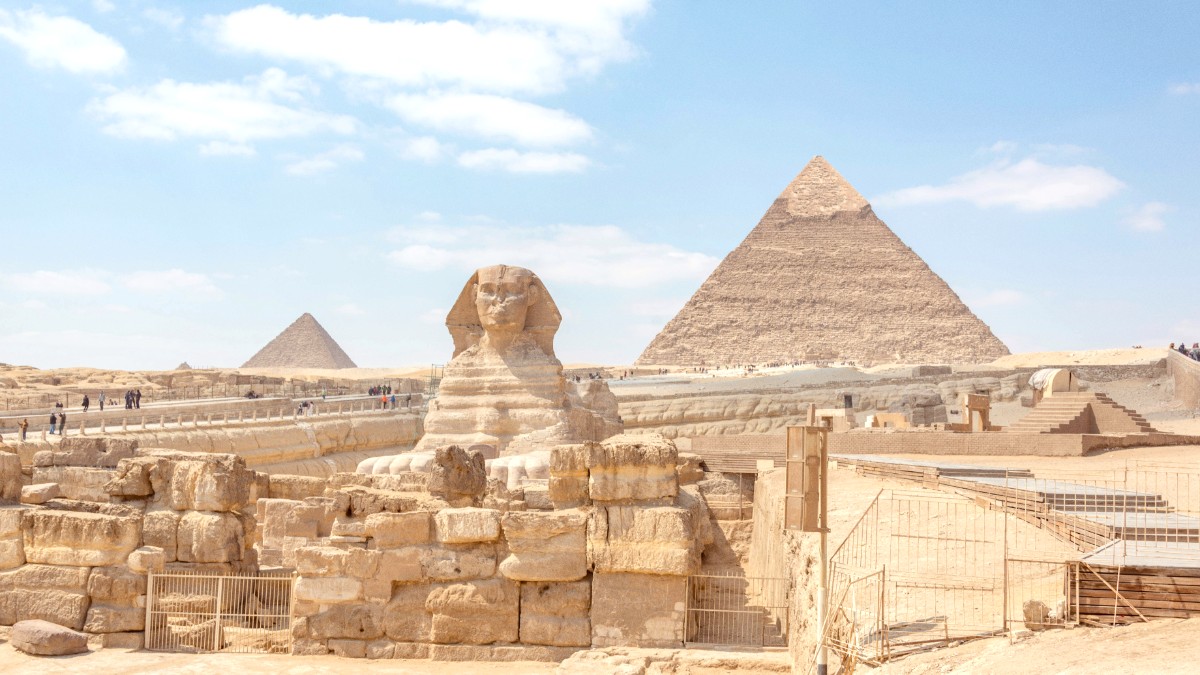
Cairo, Egypt
The weather varies greatly throughout the year, influencing your experience. Consider climate patterns and tourist seasons for your travel dates.
Early morning visits to the Giza Pyramids are highly recommended, regardless of the season, to avoid midday heat and the largest crowds. This also offers better light for photography.
High Season (October-April): Ideal weather for exploration, clear skies. Higher prices for flights and accommodation. Larger crowds, especially during holiday periods like Christmas and New Year's. Booking well in advance is advisable.
Extreme Heat
Significantly lower prices for flights and accommodation. Minimal crowds at tourist attractions. Suitable for budget-focused travelers.
Extreme heat makes outdoor activities uncomfortable. Prolonged exposure to temperatures can present health risks. Plan activities for early morning or late afternoon.
Rising Temperatures
Temperatures are pleasant, fewer crowds compared to high season. Potentially lower prices for flights and lodging.
May can begin to get hot, and September can remain warm. The risk of Khamsin winds in May affects travel or outdoor sightseeing.
General Sightseeing
October to April offers the best temperatures for comfortable exploration of the Pyramids, Sphinx, and museums. Desert activities are best in cooler months.
Always visit the Giza Pyramids in the early morning to avoid midday heat and the largest crowds, securing better light for photos.
Citizens of many countries qualify for a Visa on Arrival (VoA) for 30 days, purchasable at major international airports. An E-Visa is a recommended option for most nationalities eligible for a VoA, applied online through the official Egyptian E-Visa portal. For convenience, services like IVisa or VisaHQ process applications. Some countries require a prior visa from an Egyptian embassy. Always check the latest information from an official Egyptian government source before your trip as rules can change.
Your passport must be valid for at least six months beyond your planned date of departure from Egypt. A valid visa (printout of e-Visa or proof of VoA eligibility) is necessary. Passport-sized photos may be needed for VoA or embassy applications. Immigration officials sometimes request proof of onward/return travel and hotel booking confirmation. Keep these documents readily accessible.
US$25 for single entry (30 days).
US$25 for single entry, US$60 for multiple entry.
EGP 500 (approx. US$16-17) for foreign adults. EGP 250 for foreign students with ISIC card. Children under 6 free.
EGP 900 (approx. US$29-30).
EGP 200 (approx. US$6-7).
Egypt generally presents good value for travelers, but costs fluctuate based on your travel style. The official currency is the Egyptian Pound (EGP), abbreviated as LE.
ATMs are widely available in Cairo and Giza. Banks and official exchange offices also provide currency exchange. Larger hotels, upscale restaurants, and major shops widely accept credit cards (Visa and Mastercard). Many smaller establishments are cash-only. Always carry enough cash for daily expenses and tipping.
Tipping is customary and expected for almost all services in Egypt. It is a part of the local economy and a way to show appreciation.
Consider a Cairo Pass if you plan many museum and archaeological site visits. Compare the pass cost against individual ticket prices. Walk within the Giza Pyramids complex to save on internal transport.
Awareness of local conditions and preparation for common concerns is .
No specific vaccinations are required for entry to Egypt for most international travelers.
Routine vaccinations (MMR, DTP, Polio, Flu) are advisable. Hepatitis A and Typhoid are highly recommended. Hepatitis B and Rabies may be recommended depending on travel style and activities.
Private hospitals in Cairo and Giza offer higher standards of care, often with English-speaking staff. Pharmacies are widely available and well-stocked.
Reputable private hospitals include Nile Badrawi, Dar Al Fouad, and As-Salam International.
Emergency numbers: Ambulance 123, Police 122, Tourist Police 126.
Tap water in Egypt is generally unsafe for drinking. Use bottled water for all drinking, brushing teeth, and making ice. Be cautious with street food.
Ensure bottled water seals are unbroken. Avoid ice in drinks.
Choose street food stalls with high turnover. Consume only well-cooked, hot food. Avoid raw vegetables.
Cairo and Giza are generally safe. Petty crime occurs in crowded areas. Be aware of aggressive touts at the Pyramids. Sandstorms (Khamsin) are seasonal hazards.
Keep valuables secure. Stick to reputable establishments at night. Avoid large gatherings.
Sandstorms (March-May) reduce visibility. Stay indoors during severe storms. Earthquakes are rare but possible.
| Coverage Aspect | Description | Recommended Providers |
|---|---|---|
| Medical Emergencies | Hospital stays, doctor visits, emergency medical treatment. | World Nomads, SafetyWing |
| Emergency Evacuation | Medical evacuation back to your home country if needed. | Insubuy, World Nomads |
| Trip Cancellation/Interruption | Protects your investment if your trip is canceled or cut short. | World Nomads, SafetyWing |
Major credit cards are accepted at larger establishments. Always have cash for smaller venues and tips.
ATMs are widespread. Banks and official exchange offices also convert currency. Avoid airport exchanges for large amounts.
Polite bargaining for goods in markets is customary. It is part of the local shopping culture.
Always carry small Egyptian Pound denominations for fees and tips.
While Egypt is generally affordable, unexpected costs can arise, specifically around tourist areas. Be mindful of aggressive touts who demand payment for unrequested "services" or "gifts."
A clear understanding of what services cost before engaging avoids misunderstandings. Confirm prices beforehand for taxi rides and camel or horse rides at the Pyramids.
Price awareness creates a smoother experience.
Inform your bank and credit card companies of your travel dates to avoid fraud alerts or card freezes.
Exchange a small amount of Egyptian Pounds before departure for immediate needs upon arrival.
Consider a budgeting app to track expenses and stay within your financial plan.
Be aware of situations that can lead to unexpected expenses. Clear communication and firm boundaries save you money.